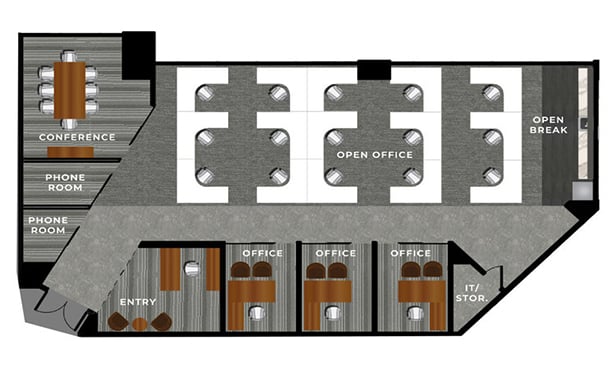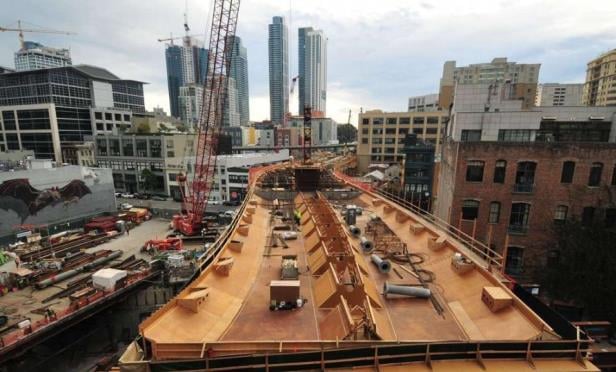DENVER—Prescient, a Denver-based software design and structural system manufacturing company, is being used in three student housing projects, demonstrating its integrated software, engineering and pre-manufactured metal framing system positively impacts the fundamental economics of construction in this sector.
The projects include a residence hall for Colorado Christian University in Lakewood, CO, The Corner, an eight-story dormitory at the University of Texas in Austin, and the 504-bed 42nd Street dormitory at the University of South Florida in Tampa.
“The Prescient system enabled significant overall schedule compression, which is a big advantage in delivering any construction project,” said Scott Miller, senior project manager for GE Johnson Construction, general contractor for Colorado Christian. Miller noted Prescient's high-quality and swift installation — the structure and framing for the 90,000 square foot building were installed in only seven weeks — enabled the entire project to be completed in just 10 months. “On-time delivery was especially critical. By using the Prescient system we were able to accelerate our entire construction schedule,” said Miller.
The Prescient structural system also allows projects to achieve higher density by adding floors without incurring cost increases normally associated with structural systems of more than six stories, like “The Corner,” a 207-bed, 80,000 square foot project that broke ground in June on the University of Texas' West campus.
“Prescient was a perfect fit for this student housing project,” said Christopher Szeliga, vice president, JE Dunn Construction. “Cost savings are inherent with this system when compared to concrete or steel, which enabled us to add an additional floor. JE Dunn is excited to be building the first Prescient project in Austin,” he added.
For the 42nd Street project, a six-story, 225,000 square foot student dormitory being built by CBG Building Company in Tampa, the most important considerations for utilizing the Prescient system were speed of installation, lower cost and reduced risk.
“Using Prescient's integrated design and construction system was the key factor in making this project a reality,” said Chris Hirst, senior vice president at CBG Building Company. “The speed and accuracy at which the Prescient system can be erected enables us to trim months off our construction schedule, to say nothing of reducing the risks associated with on-site labor shortages currently plaguing our industry,” he added.
Hirst added the Prescient platform allows the introduction of mechanical, electrical and plumbing rough-in crews earlier in the process as well, which contributes to a shortened overall construction duration.
“This system is the next evolution in construction. CBG Building Company recognized the potential of the Prescient platform early in its evolution and we intend to utilize the system as much as possible in the future,” Hirst stated.
In addition to these projects, Prescient has numerous upcoming projects at universities across the country in their development pipeline.
“We helped transform the economics of these projects while delivering a better product that is non-combustible, termite resistant and mold-proof. In addition to providing a significant cost advantage, we enabled some of the buildings to go taller since our technology platform is capable of going up to 14 stories high. We dramatically reduced time-to-market, mitigating risk for the developers and general contractors from design to installation. Net-net, lower costs coupled with higher density and faster completion schedules helped deliver better project internal rates of return and superior return on investment,” said Satyen Patel, chairman of Prescient.
The company says the end components of the platform are:
-
Durable: it will not rot, warp, shrink, split, crack or creep, and is resistant to moisture and insect infestation.
-
Lightweight: it is easy to handle and is straight, uniform and consistent in quality.
-
Strong: Cold formed steel has the highest strength-to-weight ratio of any building material, so Prescient meets the highest seismic and wind load specifications with allowable stress values ranging from 21,000 to 33,000 pounds per square inch.
-
Fire Resistant: The Prescient system is non-combustible, does not burn or contribute fuel to the spread of a fire and may contribute to lower insurance rates.
Prescient is a technology and manufacturing company with an innovative design platform that offers a faster, greener and more cost-effective alternative to conventional building structures. Prescient's primary market segment is multi-unit buildings including apartments, student housing, senior living and hotels.
Want to continue reading?
Become a Free ALM Digital Reader.
Once you are an ALM Digital Member, you’ll receive:
- Breaking commercial real estate news and analysis, on-site and via our newsletters and custom alerts
- Educational webcasts, white papers, and ebooks from industry thought leaders
- Critical coverage of the property casualty insurance and financial advisory markets on our other ALM sites, PropertyCasualty360 and ThinkAdvisor
Already have an account? Sign In Now
*May exclude premium content© 2024 ALM Global, LLC, All Rights Reserved. Request academic re-use from www.copyright.com. All other uses, submit a request to [email protected]. For more information visit Asset & Logo Licensing.








